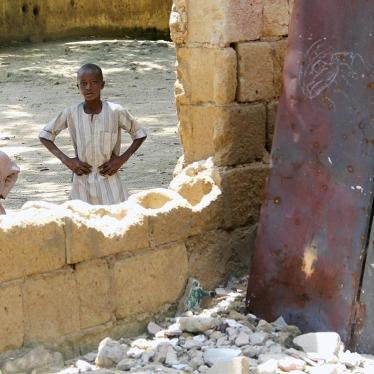(Nairobi) – The militant Islamist group Boko Haram has set more than a dozen schools on fire in northern Nigeria, Human Rights Watch said today. Since the beginning of 2012, suspected Boko Haram members have attacked, damaged, and, in a few cases, destroyed at least 12 schools in and around Maiduguri, the capital of Borno State, temporarily leaving several thousand children without access to education.
“Boko Haram’s attacks on schools represent a new and reprehensible development since the group began its campaign of violence in 2009,” said Zama Coursen-Neff, deputy children’s rights directorat Human Rights Watch. “Children and educational institutions should be left alone, full stop.”
Around February 20, the first three schools – Kulagumma Primary School, Abbaganaram School, and Budum Primary School – were set on fire. Between February 26 and 29, at least four schools were burned, and on March 1, five schools were set ablaze in what appeared to be a coordinated attack, including Sunshine Stars Secondary School and Success Secondary School, which had an enrollment of 700. As a result of the attacks, news reports state that at least 5,000 students are staying home from school.
A purported spokesman for Boko Haram, Abul Qaqa, has claimed the group’s responsibility for the attacks on schools and threatened further violence. In emails and phone calls to local and foreign journalists, he asserted the attacks were in response to attacks against Quranic schools and the arrest of local clerics by members of the security forces. Nigerian officials have long accused some Islamic teachers in this area of using their Quranic schools as recruitment and training grounds for new Boko Haram members.
On February 26, Qaqa claimed that the February 20 attacks were in retaliation for raids by the state security forces on Islamic schools in Maiduguri and “indiscriminate arrests of students of Quranic schools by security agents.” On March 5, local and foreign correspondents reported receiving a message from Qaqa that claimed responsibility for all the recent attacks on schools, including an attempt to burn a school that morning. The March 5 attack was reportedly thwarted by the Nigerian military, resulting in the deaths of three Boko Haram members. Qaqa was reported in the local media to have said, “Certainly, if Quranic education will not be allowed to continue, then secular and Western education will not continue also.”
All of the attacks have occurred either at night or in the early morning hours. On February 26, Qaqa was quoted as saying, “We are attacking the public schools at night because we don’t want to kill innocent pupils.”
Attacks on schools by armed groups not only put children and teachers’ lives at risk, but they may also deprive children of an education, Human Rights Watch said. Schools may close and children drop out entirely. Even when classes resume after an attack, the quality of education may suffer when students and teachers are afraid and learning materials are damaged. Threats of attacks may also force neighboring schools to close or parents to keep their children at home.
Nigeria is a party to the International Covenant on Economic, Social and Cultural Rights and the Convention on the Rights of the Child, both of which guarantee children the right to education.
Boko Haram, which means “Western education is a sin” in the Hausa language of northern Nigeria, seeks to impose a very strict form of Sharia or Islamic law in northern Nigeria and to end corruption. Violence by Boko Haram can be traced to five days of clashes in 2009 between the group and members of the security forces in Borno, Yobe, Bauchi, and Kano states that left more than 800 people dead, including at least 30 police officers. The police captured and summarily executed, outside the police headquarters in Maiduguri, the Boko Haram leader, Mohammed Yusuf, along with at least several dozen of his followers.
A year later, in July 2010, Boko Haram began a campaign of increasingly deadly attacks, including suicide bombings that have claimed the lives of more than 1,000 people. The group has claimed responsibility for bombing churches, police stations, military facilities, banks, and beer parlors in northern Nigeria, as well as the United Nations building and police headquarters in Abuja, the nation’s capital. Suspected Boko Haram members, often riding motorcycles and carrying Kalashnikov military assault rifles under their robes, have gunned down numerous police officers, soldiers, and Christians, and assassinated local politicians, community leaders, and Islamic clerics who oppose the group. The vast majority of these incidents have taken place in Maiduguri.
In response to the escalating attacks, President Goodluck Jonathan declared a state of emergency on December 31 in parts of Borno, Niger, Plateau, and Yobe states. Boko Haram alleges that Islamic teachers who run Quranic schools have been detained by the security forces during sweeps throughout neighborhoods and villages in and around Maiduguri. Some 1,000 Chadian nationals living in Nigeria, including many children studying at Quranic schools, have reportedly fled from Nigeria to Chad in the last few weeks as a result of operations and abuses by the Nigerian security forces.
Human Rights Watch is concerned by reports that the Nigerian security forces have used excessive force, including the burning of villages, arbitrary arrests, and other abuses during some of these raids, and urges the state and national governments to ensure that all law enforcement operations are conducted in full accordance with international human rights standards.
“Nigeria’s security forces have been under immense pressure to address the rising tide of attacks by Boko Haram,” Corinne Dufka, senior West Africa researcher at Human Right Watch said. “Besides taking measures to prevent violence, though, the authorities need to make every effort to keep the police and military from committing abuses and making matters worse.”





